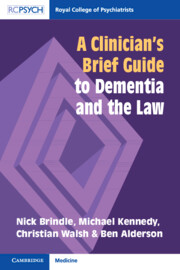Book contents
- A Clinician’s Brief Guide to Dementia and the Law
- A Clinician’s Brief Guide to Dementia and the Law
- Copyright page
- Contents
- Preface
- Common Abbreviations
- Chapter 1 Dementia
- Chapter 2 Dementia
- Chapter 3 Dementia
- Chapter 4 The Mental Capacity Act 2005
- Chapter 5 The Mental Health Act 1983
- Chapter 6 The Care Act 2014
- Chapter 7 Assessment of Capacity
- Chapter 8 The Diagnosis of Dementia
- Chapter 9 Care and Treatment Issues and the Law
- Chapter 10 Deprivation of Liberty
- Chapter 11 Discharge from Hospital
- Chapter 12 Abuse and Safeguarding
- Chapter 13 The Courts and Tribunals
- Chapter 14 The Interface between Dementia and the Criminal Justice System
- Book part
- References
- Index
Chapter 11 - Discharge from Hospital
Published online by Cambridge University Press: 20 July 2023
- A Clinician’s Brief Guide to Dementia and the Law
- A Clinician’s Brief Guide to Dementia and the Law
- Copyright page
- Contents
- Preface
- Common Abbreviations
- Chapter 1 Dementia
- Chapter 2 Dementia
- Chapter 3 Dementia
- Chapter 4 The Mental Capacity Act 2005
- Chapter 5 The Mental Health Act 1983
- Chapter 6 The Care Act 2014
- Chapter 7 Assessment of Capacity
- Chapter 8 The Diagnosis of Dementia
- Chapter 9 Care and Treatment Issues and the Law
- Chapter 10 Deprivation of Liberty
- Chapter 11 Discharge from Hospital
- Chapter 12 Abuse and Safeguarding
- Chapter 13 The Courts and Tribunals
- Chapter 14 The Interface between Dementia and the Criminal Justice System
- Book part
- References
- Index
Summary
Discharge planning of older people with dementia to a domestic or care home setting can present difficult practical, legal and ethical dilemmas to the hospital clinician. There may be a different and challenging profile of risks whichever strategy is pursued, but undoubtedly the issue of where someone lives or the care they receive has profound personal importance. Decision-making around these issues exemplifies the tension between preserving autonomy and protection of the individual. A hospital admission can act as a watershed point whereby a view is taken that the person requires a different approach to their care. If the person comes from a domestic setting, this may lead to instigating or modifying an existing care package or moving to a care home. Furthermore, it is generally accepted that the services available in the community for this large and growing patient group are inadequate, the applicable legal framework itself is often complex and unwieldy and, inevitably, the planning process involves more than a single agency. We discuss the key legislation, guidance and processes relating to discharge of a person with dementia from both general and psychiatric hospital settings.
Keywords
- Type
- Chapter
- Information
- A Clinician's Brief Guide to Dementia and the Law , pp. 106 - 119Publisher: Cambridge University PressPrint publication year: 2023

